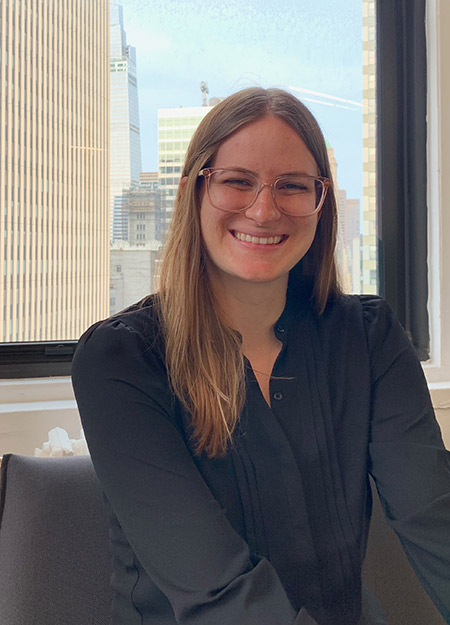Our annual Student Summer Series presents first-person reflections from a few Berkeley Law students who are engaged in intriguing summer work across a wide swath of practice areas. While only a sampling of the valuable job experience and skill development students gain all over the legal landscape, we hope the series provides a glimpse into the rewarding opportunities they regularly access, often in partnership with our Career Development Office.
Rising 3L Lauren Davis has worked for two Berkeley Law journals and is now publishing editor of the California Law Review. Active in multiple school pro bono projects, she also volunteered for the Central Valley Expungement Clinic, which assists qualifying low-income litigants with a criminal record eligible for expungement. Last summer, Davis worked in the Capital Habeas Unit at the California Eastern District’s Office of the Federal Public Defender. She then became a Berkeley Law pod leader for groups of incoming 1Ls and transfer students, and externed with the environmental rights organization Leadership Counsel for Justice and Accountability.
Below, Davis describes her summer work at Neighborhood Defender Service of Harlem, a renowned public law office that represents clients, addresses systematic discrimination poor people face when accused of crimes, and provides social service assistance.

Prior to law school I worked in state court administration, where I was charged with helping the court implement the changes affected by a California law that allows most people with felony convictions to serve on juries. I became curious about how other courts throughout the state implemented the law, and after finding that most courts had not properly communicated the change to county residents, I got involved in research related to the ubiquitous consequences of any contact with the criminal legal system.
Since then, I’ve geared my law school activities toward my goal of working to reduce the impact of “collateral consequences” of contact with legal systems, particularly in my hometown of Fresno.
Working at Neighborhood Defender Service of Harlem in their Collateral Consequences Unit was exciting to me because it provides the opportunity to see civil public defense and true holistic defense given that attorneys work in teams across the civil, criminal, immigration, and family law disciplines. I hope to leverage this experience to support civil defense and reentry work in the Central Valley after graduation.
My summer at Neighborhood Defender Service of Harlem has been enlightening and fulfilling. After a week-long orientation where we learned about each of the practice groups, we split into our respective units.
To this point, I’ve staffed community intake for New York City’s Right-to-Counsel program, drafted a direct examination for an employment licensing hearing and assisted with witness preparation, drafted a discovery demand letter for a police property forfeiture case, and provided procedural advice to Harlem residents through our organization’s community hotline. I’m also in the beginning stages of learning to file notice of claims for police misconduct.
My favorite part of NDS is being around lawyers and advocates who believe in tailoring their work to reach the client’s stated goals, rather than imposing their own sense of what is best. Moreover, I’ve seen advocates successfully push for outcomes that may seem unrealistic, but do so anyway because of their unwillingness to accept the status quo when clients are faced with injustice.
This is my first time living outside of California and while it has definitely been a bit overwhelming to adjust to a new environment, my world here has quickly become smaller. Though NDS is one of the smaller public defender offices in New York City, one of the supervising attorneys in my unit is a Berkeley Law alum, and I recently found out he’s even from my hometown.
Being part of the Berkeley Law community was pivotal in allowing me to take on this opportunity. The work can be hard, but I’m always lifted back up by my classmates who are also navigating both the intellectual and emotional challenges of public defense and other types of public interest work. I’m also thankful to Professors Khiara M. Bridges, Patricia Plunkett Hurley, and Jonathan D. Glater, whose support during law school has helped give me the confidence to take on this work and — temporarily — this city.